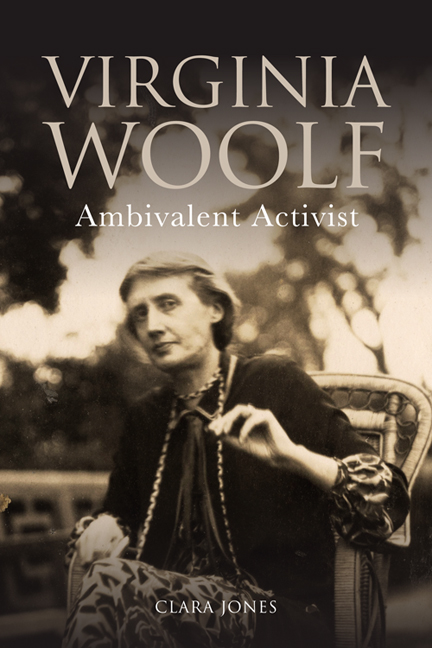Book contents
- Frontmatter
- Contents
- Acknowledgements
- Abbreviations
- Introduction
- 1 Virginia Stephen and Morley College, 1905–7
- 2 Virginia Stephen and the People's Suffrage Federation, 1910
- 3 Virginia Woolf and the Women's Co-operative Guild, 1913–31
- 4 Virginia Woolf and the Rodmell Women's Institute, 1940–1
- Conclusion
- Appendix 1 The ‘Morley Sketch’
- Appendix 2 The ‘Cook Sketch’
- Bibliography
- Index
- Frontmatter
- Contents
- Acknowledgements
- Abbreviations
- Introduction
- 1 Virginia Stephen and Morley College, 1905–7
- 2 Virginia Stephen and the People's Suffrage Federation, 1910
- 3 Virginia Woolf and the Women's Co-operative Guild, 1913–31
- 4 Virginia Woolf and the Rodmell Women's Institute, 1940–1
- Conclusion
- Appendix 1 The ‘Morley Sketch’
- Appendix 2 The ‘Cook Sketch’
- Bibliography
- Index
Summary
My puzzle is, ought artists now to become politicians? My instinct says no; but I'm not sure that I can justify my instinct. I take refuge in the fact that I've received so little from society that I owe it very little. But thats not altogether satisfactory; and anyhow it doesn't apply to you. I suppose I'm obtuse, but I cant find your answer in your letter, how it is that you are going to change the attitude of the mass of people by remaining an art critic. (L6 420–10)
This extract from Woolf's 1940 correspondence with Ben Nicolson on the subject of Bloomsbury's social commitments and their legacy initially sounds very like a restatement of her theory of women's outsidership in Three Guineas. This is clear in the rationale of her statement: ‘I've received so little from society that I owe it very little’. Yet further probing of this tricky, heavily licensed passage suggests this reading does not ring true. This passage unravels the logic of its tentative central thesis and, rather than being an endorsement of operating outside the mainstream and a rejection of social participation, it is in fact a key statement of Woolf's ambivalence, full of equivocation and loaded with self-critique. This is most clear in Woolf's ambiguous admission: ‘thats not altogether satisfactory’. It is unclear whether Woolf is suggesting that the rationale of receiving from and in turn owing society is itself faulty or if she is revealing a more specific uneasiness, as a privileged woman who admitted to being ‘hampered by the psychological hindrance of owning capital’ (D1 101), about her self-deceiving fantasy of having ‘received so little’ from society. This passage with its defensive and arch tone may seem a bathetic place to close this book on Woolf's activism, however it demonstrates acutely the ways in which questions of participation and social responsibility preyed on Woolf's mind and so seems appropriate.
It is tempting to read this extract as engaging specifically with the question of the political role of art and the artist.
- Type
- Chapter
- Information
- Virginia WoolfAmbivalent Activist, pp. 207 - 209Publisher: Edinburgh University PressPrint publication year: 2015



